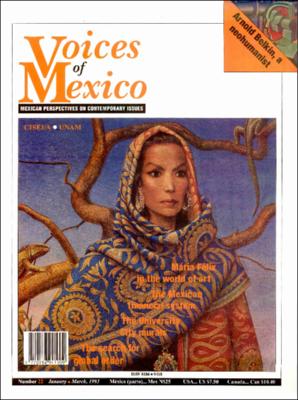Mostrar el registro sencillo del ítem
Voices of Mexico: Mexican Perspectives on Contemporary Issues
| dc.rights.license | http://ru.micisan.unam.mx/page/terminos | |
| dc.contributor.editor | Toro Gayol, Marybel | |
| dc.contributor.other | Velasco Montante, Astrid | |
| dc.date.accessioned | 2019-01-17T23:58:58Z | |
| dc.date.accessioned | 2022-02-17T00:15:37Z | |
| dc.date.available | 2019-01-17T23:58:58Z | |
| dc.date.available | 2022-02-17T00:15:37Z | |
| dc.date.issued | 1993 | |
| dc.identifier.issn | 0186-9418 | |
| dc.identifier.uri | https://ru.micisan.unam.mx/handle/123456789/21917 | |
| dc.format | application/pdf | |
| dc.format.extent | 104 pp. | |
| dc.language.iso | eng | |
| dc.publisher | Universidad Nacional Autónoma de México, Coordinación de Humanidades, Centro de Investigaciones sobre Estados Unidos de América | |
| dc.relation.isformatof | ||
| dc.relation.haspart | Our Voice /Margáin, Hugo B.; The Search for Global Order /Schmidt, Helmut; End of the Century Trends / Margáin, Hugo B.; Teotihuacan/ Manzanilla, Linda; The History of Mexico City (part III) / Ortiz Macedo, Luis1 Current Environmental Issues in Mexico / Ortíz Monasterio, Fernando; The Mexican Financial System/ Suárez González, Eduardo; Foreign Policy and Mexico"s Modernization Project/ Peñaloza W., Tomás; María Félix in the World of Art/ Toro Gayol, Marybel; The University City Murals /Cruz González Franco, Lourdes; The ""Latin Boom"" in Visual Arts /Griswold del Castillo, Richard; America: An Ongoing Discovery / Pellicer, Juan; Confederate Colonization of Mexico/ Casellas, Roberto Spanish is our Language… And So is English/ Ávila, Raúl; Mexican Press Coverage of the US Elections (Part III) / Acosta, Miguel; Cárdenas, Graciela; Osnaya, Marcela Rufino Tamayo International Art Museum / Paz, Mauricio de la; Arnold Belkin: A Neohumanist / Toro Gayol, Marybel; Luis Cardoza y Aragón and Rafael Solana/ Montiel Ziegler, Elsie Rigoberta Menchú, Winner of the Nobel Peace Prize/ Villanueva, Raquel; Human Development, The Environment and international Order: a Latin American Perspective / Ferrer, Aldo; The Lawyer of the 21st Century / Melgar; Mario Shrove Tuesday / Casas, Rosamaría; Surface Archeology/ Aguirre, Eugenio | |
| dc.relation.requires | Adobe Acrobat | |
| dc.subject | HUMANIDADES Y CIENCIAS DE LA CONDUCTA | |
| dc.title | Voices of Mexico: Mexican Perspectives on Contemporary Issues | |
| dc.audience | Estudiantes | |
| dc.audience | Maestros | |
| dc.audience | Investigadores | |
| dc.audience | Otros públicos | |
| dc.audience | Medios de comunicación | |
| dc.contributor.assistanteditor | Montiel Ziegler, Elsie | |
| dc.contributor.assistanteditor | García Chávez, Alonso | |
| dc.contributor.businessmanager | Ocampo, Consuelo | |
| dc.contributor.copyeditorandtranslator | Cuicani | |
| dc.contributor.designer | Noriega, Ricardo | |
| dc.contributor.designer | Belmar, Marco Antonio | |
| dc.contributor.editorinchief | Margáin, Hugo B. | |
| dc.contributor.layout | Glypho, Taller de Gráfica | |
| dc.contributor.printer | Artes Gráficas Panorama | |
| dc.contributor.salesandcirculationmanager | Creamer, Cynthia | |
| dc.contributor.salesandcirculationmanager | Romero, Ángel | |
| dc.coverage.placeofpublication | México | |
| dc.date.printcopyrighted | [ca. 1993] | |
| dc.description.extract | In this issue we will visit the Viceregal museum housed in the convent of Tepozotlán. Mexico formed part of the Spanish empire for three centuries (1521-1821) a period that left indelible evidence of the fusion of two cultures: indigenous Mexican and Spanish that are visible in every expression of human intelligence. The indigenous cultures are interwoven with the European via Spain, in language, literature,music and innumerable other expressions, including architecture that developed a style exclusive to Mexico called the indigenous ultrabaroque. Mexico belongs to these great cultures and preserves them both. Contemporary problems of sovereignty in a globalized world are the subject of severalarticles. Nineteenth century sovereignty is quiteunlike the sovereignty of our day, due to world problems that overflow national borders. The latest book from the Club of Rome, The firstglobal revolution, by Alexander King and Bertrand Schneider, emphasizes our enormous global problems. Their magnitude was unknown to national governments and international organizations in the past, requiring that both change in order to confront them. Preservation of the environment requires an organized, scientific approach by all countries. The beginning of disarmament reveals the possibility of solutions to global problems and of supportfor the development of economically disadvantaged populations. The gathering of numerous heads of state at the Rio Summit was aimed at worldwideecological defense. Worried by man"s predatorybehavior so often due to reprehensible economicmotives, they proposed worldwide efforts to saveour planet. No wonder Goethe said "The godsshould be feared by the human race! " As shownin "Song of the Fates", man"s own will has brought about systematic ecological devastation. It is humanity that has destroyed the only planet known to sustain life. The fifth centennial of Columbus" first voyage is discussed by one of Mexico"s foremost thinkers, Leopoldo Zea, who has dedicated his life to studying Latin American history. The distinguished Chinese statesman, Huang Hua, refers to his country "s viewpoint regarding the birth of a new world order. Our magazine closes a cycle with his article. Pierre Elliot Trudeau, of our continent, contributed to the first issue of our new era (Number 17); Valery Giscard D"Estaing, a prominent European, inissue 18; Olusegun Obasanjo, of Africa, gave hisopinion on the movement toward world globalization in issue 20. In this issue we have an intellectual and politician from Asia. The National University of Mexico reaffirms its universal vocation, a sign of the times, while defending the national image. Preliminary negotiations for the Free Trade Agreement between Mexico, the United States and Canada have recently concluded. This historic measure, leading to the creation of the world"s largest market, has been discussed by experts in number of articles. The current state of the NAFTA process is included in this issue. The USSR was unable to celebrate the 70th anniversary of Lenin"s great power disintegrated at the beginning of the year. An account of its 60th anniversary in December 1982 bears witness to one of its last celebrations in history. November 20, 1992, will mark the fortieth anniversary of the University City campus, built to house the National University of Mexico, where education and research continue their lofty purpose of contributing to the nation"sprogress. The University is a descendant of the Royal and Pontifical University of New Spain founded in 1551, thirty years after Tenochtitlan was seized by Cortés" troops. The University was the result of the colony"s first Archbishop, Friar Juan de Zumárraga"s efforts as a teacher, and the support of its first Viceroy, Don Antonio de Mendoza. Nowadays, the University is autonomous; no authority outside the University is allowed to interfere in its decisions. It enjoys complete academic freedom; any doctrine may be taught, meaning that it is open to every current of domestic and universal thought. The University"s fine buildings and beautiful surroundings provide an appropriate setting for its vital mission. The issue ends with an account written by one of its architects, of the extraordinary efforts involved inbuilding the University City campus | |
| dc.discipline.clase | Multidisciplina | |
| dc.educationlevel | Medio superior | |
| dc.educationlevel | Superior | |
| dc.educationlevel | Posgrado | |
| dc.identifier.cisan | VOM_1993_0022 | |
| dc.identifier.conacyt | CONACYT | |
| dc.relation.issued | 22, January-March, 1993 | |
| dc.rights.accesslevel | openAccess | |
| dc.rights.creativecommons | http://creativecommons.org/licenses/by-nc-nd/4.0 | |
| dc.subject.conacyt | 4 | |
| dc.type.spa | other | |
| dc.view.accesslevel | DISPONIBLE |
Ficheros en el ítem
Este ítem aparece en la(s) siguiente(s) colección(ones)
-
Números completos [125]
MiCISAN, Repositorio Institucional
Hecho en México, todos los derechos reservados 2018. Esta página puede ser reproducida con fines no lucrativos, siempre y cuando no se mutile, se cite la fuente completa y su dirección electrónica. De otra forma, requiere permiso previo por escrito de la institución.
Sitio Web administrado por: Centro de Investigaciones sobre América del Norte • micisan@unam.mx








